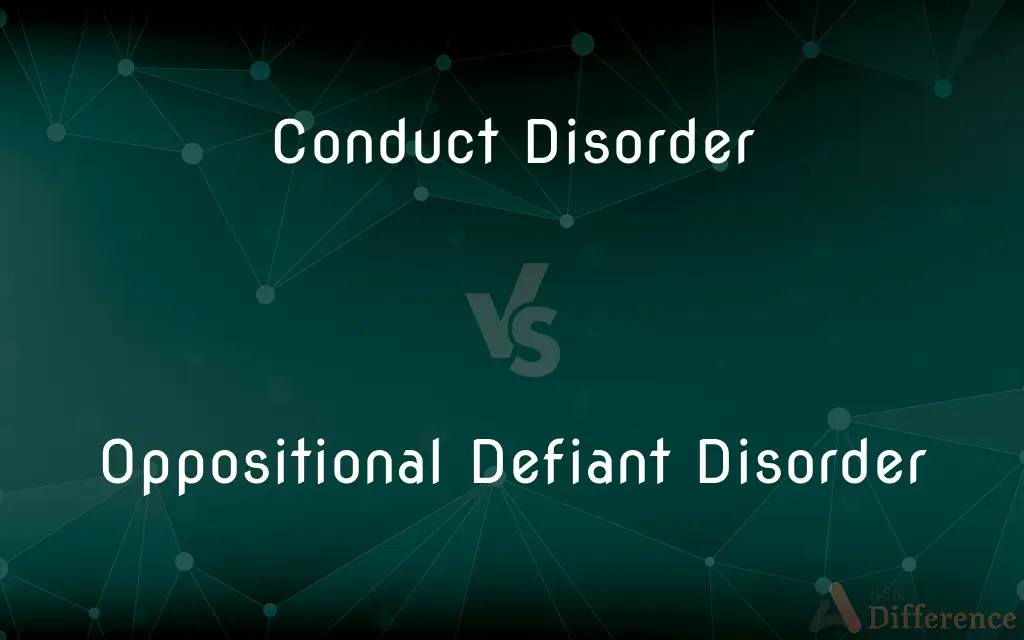Conduct Disorder vs. Oppositional Defiant Disorder — What's the Difference?
By Tayyaba Rehman & Fiza Rafique — Published on March 12, 2024

Difference Between Conduct Disorder and Oppositional Defiant Disorder
Table of Contents
ADVERTISEMENT
Key Differences
Conduct Disorder (CD) and Oppositional Defiant Disorder (ODD) are both mental health conditions diagnosed in childhood or adolescence, but they differ significantly in the severity and nature of behaviors. CD is marked by behaviors that infringe on the rights of others and societal norms, such as aggression toward people and animals, destruction of property, deceitfulness, theft, and serious rule violations. These behaviors are more severe than typical childhood mischief or rebellion.
ODD is characterized by a persistent pattern of angry, irritable moods, argumentative, defiant behavior towards authority figures, and vindictiveness. While ODD involves resistance to authority and can cause significant problems at home and school, it does not include the aggressive violations of societal norms that define CD.
Children and adolescents with CD may have experienced ODD behaviors earlier in their development, suggesting that ODD can sometimes precede CD. However, not all individuals with ODD will develop CD. The treatment for each disorder varies, with CD often requiring more intensive interventions, possibly including legal intervention, while ODD treatments focus on behavior management strategies, parent training, and sometimes medication for co-occurring conditions.
The distinction between these disorders is crucial for determining the appropriate treatment and support. Both conditions can significantly impact a child's life and development, requiring early intervention and tailored approaches to address the unique challenges each disorder presents.
Comparison Chart
Definition
A pattern of behavior that violates societal norms and the rights of others.
A pattern of angry, irritable moods, and defiant behavior towards authority figures.
ADVERTISEMENT
Key Behaviors
Aggression to people and animals, destruction of property, deceitfulness, theft.
Argumentativeness, defiance, irritability, vindictiveness towards authority.
Severity
Involves serious violations of rules and social norms.
Less severe, does not include aggression or property destruction.
Treatment
May include legal interventions, psychotherapy, and sometimes medication.
Focuses on behavior management, parent training, and psychotherapy.
Progression
ODD can precede CD, but not all with ODD develop CD.
Considered a less severe form, with some cases potentially evolving into CD.
Compare with Definitions
Conduct Disorder
Involves significant aggression towards people or animals.
A child with CD may harm pets or other children without remorse.
Oppositional Defiant Disorder
Symptoms include frequent temper tantrums and argumentative behavior.
Refusing to comply with rules and arguing excessively are indicative of ODD.
Conduct Disorder
Treatment often requires a multi-faceted approach including therapy and community support.
Interventions for CD might involve behavioral therapy and support groups.
Oppositional Defiant Disorder
Treatment focuses on behavioral strategies and parent training.
Parent-management training programs are effective for families dealing with ODD.
Conduct Disorder
A psychiatric disorder characterized by a repetitive and persistent pattern of behavior violating the basic rights of others.
A teenager with CD might engage in physical fights, vandalism, or bullying.
Oppositional Defiant Disorder
Less severe than CD but can significantly impact social and academic functioning.
ODD behaviors can lead to difficulties in school and with peers.
Conduct Disorder
Associated with higher risk of substance abuse and legal issues.
Adolescents with CD are at increased risk of drug use and encounters with the juvenile justice system.
Oppositional Defiant Disorder
Can co-occur with other mental health disorders like ADHD.
Many children diagnosed with ODD also exhibit symptoms of ADHD.
Conduct Disorder
May include theft or deceitfulness as part of the behavior pattern.
Frequently lying or stealing from family members are signs of CD.
Oppositional Defiant Disorder
A disorder characterized by defiant, disobedient, and hostile behavior towards authority figures.
A child with ODD often loses their temper and argues with adults.
Common Curiosities
How are CD and ODD diagnosed?
Diagnosis involves a comprehensive evaluation by a mental health professional, including interviews, behavioral assessments, and, sometimes, questionnaires completed by caregivers and teachers.
What is the long-term outlook for children with CD or ODD?
The prognosis varies; early intervention and consistent treatment can improve outcomes. Untreated, CD can lead to significant legal, social, and mental health issues in adulthood.
Is medication a common treatment for ODD?
Medication is not typically the first line of treatment for ODD unless there are co-occurring disorders such as ADHD.
Can adults be diagnosed with CD or ODD?
While these disorders originate in childhood, adults can show related behaviors. CD can evolve into antisocial personality disorder.
How can parents support a child with CD or ODD?
Parents can seek professional guidance, ensure consistent and structured discipline, and model positive behavior.
What causes CD and ODD?
Causes are multifactorial, including genetic, environmental, and psychological factors, such as family history of mental health disorders, exposure to violence, and inconsistent parenting.
Are there effective treatments for CD and ODD?
Yes, treatments including therapy, parent training, and medication for co-occurring conditions can be effective in managing symptoms and improving behavior.
Can a child have both CD and ODD?
Typically, a diagnosis of CD encompasses the symptoms of ODD, so a separate ODD diagnosis is not made if CD is present.
What role do schools play in managing these disorders?
Schools can provide support through individualized education plans (IEPs), behavioral interventions, and collaboration with mental health professionals.
Can CD or ODD be cured?
While there's no cure, appropriate treatment and support can significantly reduce symptoms and improve functioning.
Share Your Discovery

Previous Comparison
Asset Management vs. Investment Management
Next Comparison
Window Washing vs. Window CleaningAuthor Spotlight
Written by
Tayyaba RehmanTayyaba Rehman is a distinguished writer, currently serving as a primary contributor to askdifference.com. As a researcher in semantics and etymology, Tayyaba's passion for the complexity of languages and their distinctions has found a perfect home on the platform. Tayyaba delves into the intricacies of language, distinguishing between commonly confused words and phrases, thereby providing clarity for readers worldwide.
Co-written by
Fiza RafiqueFiza Rafique is a skilled content writer at AskDifference.com, where she meticulously refines and enhances written pieces. Drawing from her vast editorial expertise, Fiza ensures clarity, accuracy, and precision in every article. Passionate about language, she continually seeks to elevate the quality of content for readers worldwide.
















































